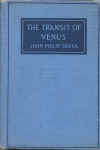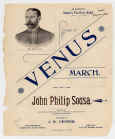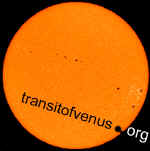[Note: A separate Transit of Venus Music page includes the contributions of John Philip Sousa.]
 http://www.wgpark.com/page.asp?pid=10
http://www.wgpark.com/page.asp?pid=10
John Philip Sousa, the famous bandmaster, wrote a 1920 novel Transit of
Venus about an imaginary voyage to photograph the event.
John Philip Sousa
 http://www.loc.gov/rr/perform/ihas/
http://www.loc.gov/rr/perform/ihas/
The Library of Congress has compiled a thorough collection of music related
to the transit of Venus, including
John Philip Sousa's Transit of Venus March. You can see the entire
history of Sousa's piece, hear a modern orchestrated version, and download
a FREE band score. Sousa originally composed the march for the unveiling
ceremony of the statue of Joseph
Henry, the first Secretary of the Smithsonian
Institution. The ceremony had been planned to occur before the 1882
transit, but didn't actually happen until April 19, 1883. Henry, whose
statue is now in front of the Smithsonian "Castle" in Washington,
D.C., was on the U.S. Transit of Venus Commission. (More info from Sun-Earth
Connection Education Forum Venus Transit Background Reading- Music and
Literature at http://sunearth.gsfc.nasa.gov/sunearthday/2004/vtbackmusic.htm.
http://www.transitofvenus.org/phmband-intro.mp3
Megan Dowell, Family Readiness Leader of the 428th MP Company, and Chuck
Bueter introduce John Philip Sousa's Transit of Venus March at the 2004
Spring Band Concert; (audio only).
http://www.transitofvenus.org/phmband.mp3
The PHM Band performs John Philip Sousa's Transit of Venus March at
the 2004 Spring Band Concert; (audio only).
From the Washington Post, October 31, 2003
Dusting Off a Rarity for Venus's Celestial March
By Reilly Capps
Legendary Washington composer John Philip Sousa likely watched
on Dec. 6, 1882, as the planet Venus eclipsed a small part of the sun. This rare
alignment -- when the planet's orbit takes it between the Earth and the sun --
is called the "Transit of Venus."
Shortly after the astronomical phenomenon, Sousa began work on a musical march
of the same name.
Sousa wrote at least four marches about the way the heavenly
bodies march across the night sky. The march king was a member of the
astrology-loving Masons, and he paid close attention to the movement of the
heavens.
But the "Transit of Venus March" never caught on, and went unplayed
for more than 100 years. Sousa's copies of the music were destroyed in a flood.
But now Venus is approaching another transit, and fans of Sousa are resurrecting
the forgotten march. It will be performed at 8 tonight at the Schlesinger
Concert Hall in Alexandria.
"The interesting thing about band leaders at the time is that their concept
of the universe was that there was this hidden balance and all these cosmic
things going on," says Sten Odenwald, an astronomer at NASA's Goddard Space
Flight Center in Greenbelt. Odenwald is preparing for June 8, when Venus will
block out part of the sun for the first time in nearly 122 years. He has
also worked with the Virginia Grand Military Band to organize the performance of
"Transit of Venus."
Unlike "Stars and Stripes Forever" or "The Washington Post
March," Sousa's "Transit of Venus" did not bring Sousa fame, nor
did the novel Sousa wrote with the same title.
Loras Schissel, who works in the music division of the Library of Congress,
found the old sheet music for "Venus" languishing in the library's
files.
"It's a little three-minute gem," says Schissel, who also conducts the
Virginia Grand Military Band. "It was written in a time when people were
less cynical and more optimistic. It was America on the threshold of thinking
that anything was possible, and Sousa captured that feeling perfectly."
Because bands today use different instruments than they did in
the 1880s, Schissel had to rework the score for a modern ensemble. Last year,
the Virginia band trotted the new version out for a test run. But most people,
including John Philip Sousa IV, the composer's great-grandson, have never heard
it performed. He will attend tonight's performance and hear it live for the
first time.
The band will play the "Transit" march more frequently in the next few
months as astronomers wait for the actual event. The 1882 transit was
accompanied by enormous fanfare. Thomas Hardy worked it into the plot of a
novel, and the event was covered by the press worldwide. Boys stood on the
street corners of New York, offering a glimpse through telescopes for a dime.
Odenwald believes the 2004 transit should receive much the same response.
The Rachel M. Schlesinger Concert Hall is at 3001 N. Beauregard Rd., Alexandria.
Tickets, available at the door, will be $20 for adults and $10 for students.
Would you like to send this article to a friend? Go to
http://www.washingtonpost.com/ac2/wp-dyn/admin/emailfriend?contentId=A49214-2003Oct31&sent=no&referrer=emailarticle
 Note: The Bovaco Catalog carries John
Philip Sousa's Transit of Venus March band arrangement. The march
costs $25.00 (plus UPS shipping) for a reprint of each published part on 8.5 x
11-inch pages. You may reproduce as many copies for your own use as
necessary. You may call them at (480) 948-9870 or write them at The
Detroit Concert Band, Inc.,
Note: The Bovaco Catalog carries John
Philip Sousa's Transit of Venus March band arrangement. The march
costs $25.00 (plus UPS shipping) for a reprint of each published part on 8.5 x
11-inch pages. You may reproduce as many copies for your own use as
necessary. You may call them at (480) 948-9870 or write them at The
Detroit Concert Band, Inc.,
7443 East Butherus, Suite 100, Scottsdale, AZ 85260.
http://www.dws.org/sousa/mid/transit.mid
John Philip Sousa's Transit
of Venus March; (MIDI file).
[Broken link, May 24, 2004]
[Note: Loras Schissel and the Virginia Grand Military Band
have generously given permission for their recording of Sousa's Transit of
Venus March to be included in the Transit of Venus Program being
compiled as part of a Toyota TAPESTRY grant for educators. Visit the Transit
of Venus clearinghouse at http://analyzer.depaul.edu/paperplate/transit.htm
for information on the distribution of this educational resource.
